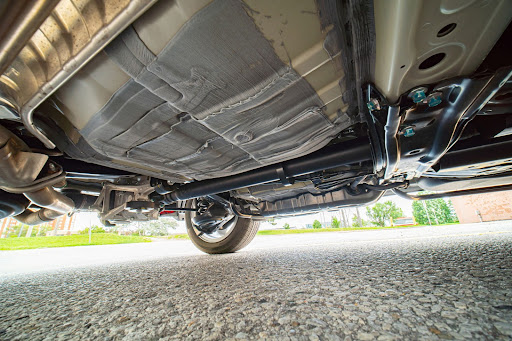Catalytic converter theft has been on the rise in recent years, and owners of some vehicles might be bigger targets. Learning how to protect your vehicle, especially if it’s one on the list of popular targets, can help reduce your chances of having the catalytic converter stolen.
What are the vehicles most likely to have a catalytic converter stolen?
Over 153,000 catalytic converters were estimated to have been stolen in 2022, a little more than in 2021. According to CARFAX, the vehicles most likely to have a catalytic converter stolen are:
- Ford F Series trucks
- Honda Accord
- Toyota Prius
- Honda CR-V
- Ford Explorer
- Ford Econoline
- Chevy Equinox
- Chevy Silverado
- Toyota Tacoma
Many of these vehicles sit higher off the ground than others, making it easier for converter thieves to access and remove the part. However, simply purchasing a vehicle with a lower clearance isn’t the best way to protect your car.
How to protect your vehicle from catalytic converter theft
Park smart
If you don’t have a garage to park your vehicle in, choose a safe, well-lit area such as beneath a streetlight. If you have a carport, leave the light on overnight as a deterrent, or invest in motion-sensing lights that can surprise a potential thief.
Purchase a theft protection device
You can also purchase a catalytic converter theft protection device and install it in your car. Considering that the average cost for the replacement of the part is $2,000-$3,000, this could be a good investment. Installing a security alarm on your car could also be a simple solution. Catalytic converter theft is often a crime of opportunity, so if a thief sees your car as an easy target once, there’s a good chance they could strike again once you’ve replaced the converter.
Etch your VIN number on the converter
You can also have an auto body professional, mechanic, or dealership etch your car’s VIN on the converter, giving you a better chance of getting it back or helping the police apprehend the thief.
What kind of insurance coverage will I need to cover this type of theft or damage?
Comprehensive insurance coverage is usually the only type of policy that covers theft damage, including theft of a catalytic converter. Many people with older, paid-off cars might have eliminated their comprehensive coverage, so they may not be covered under their insurance plan.
Each insurance carrier and plan type is different, so if you live in an area where there has been an onslaught of catalytic converter thefts, you may want to speak with a representative about your coverage and update it so that you’re protected.
Why are catalytic converters stolen so often?
A catalytic converter is part of a vehicle’s exhaust system that converts the environmentally harmful pollutants created by the engine and gasoline into less-harmful emissions. Thieves target this part specifically because of the precious metals that are used to make it:
- Platinum
- Palladium
- Rhodium
Platinum and palladium can each be sold or traded for around $1,000 per ounce. These two pale in comparison to the value of rhodium, which could be sold for about $10,000 to $15,000 per ounce. It’s easy to see how a thief could see a big payday in a catalytic converter.
However, most thieves aren’t getting thousands of dollars from just one theft. The average profit ranges from $200 to $1,200, although it could be significantly more.
How can a lawyer help me after my catalytic converter is stolen?
There are a few ways that an attorney can help you recoup your losses, not just the value of the catalytic converter itself, but also any related expenses you incur such as damage to your vehicle during the theft, or the cost of alternate transportation while you didn’t have a car.
If your car was parked somewhere it was supposed to be protected like a valet lot or overnight at a dealership, your attorney may find the property owner liable for not putting the right protections in place.
You may also seek compensation from the car manufacturer under Florida product liability laws for producing vehicles with easy-to-steal parts. Contact our Florida product liability attorneys today at (561) 655-1990 for a free consultation about your catalytic converter theft.




